Nature heals your aging body through five powerful mechanisms: sunlight exposure boosts vitamin D production, strengthening your cardiovascular system and regulating blood pressure. Outdoor activities on varied terrains enhance your balance and mobility better than indoor exercise. Natural settings immediately lower your cortisol levels, reducing harmful inflammation throughout your body. Social connections flourish in outdoor environments, combating isolation while building emotional resilience. Forest and green spaces sharpen your cognitive function, improving memory and concentration. These biological responses work together to create remarkable healing effects.
Vitamin D Production Strengthens Cardiovascular Health
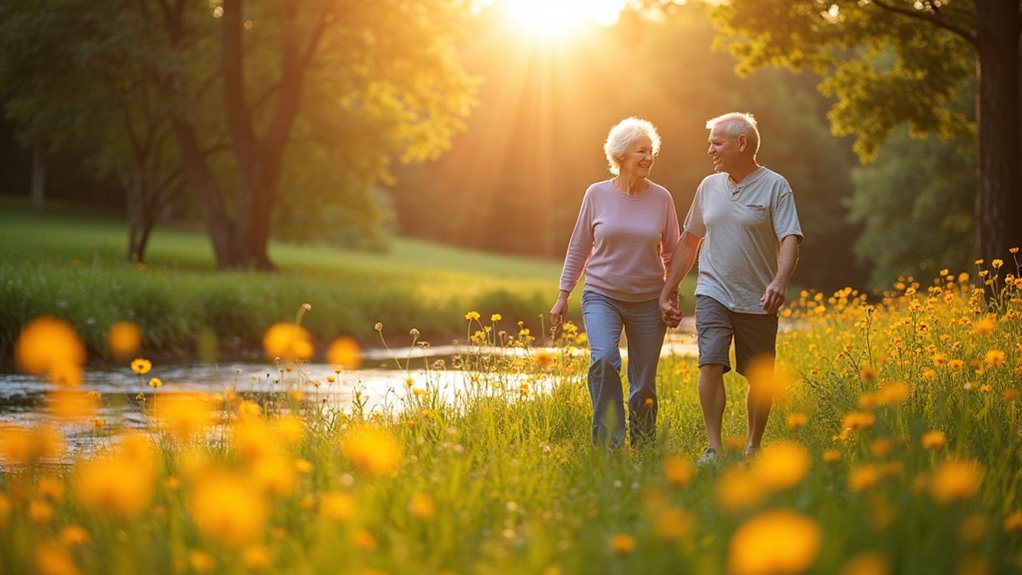
As you step outside into the warm sunlight, your skin begins producing vitamin D, a powerful hormone that directly strengthens your cardiovascular system by regulating blood pressure and reducing harmful inflammation throughout your body.
Higher vitamin D levels considerably lower your risks of heart disease, hypertension, and metabolic syndrome, making regular sunlight exposure essential for cardiovascular health as you age.
Unfortunately, aging reduces your body’s vitamin D production by 13% each decade, making consistent outdoor activity increasingly important.
As we age, our bodies become 13% less efficient at producing vitamin D each decade, emphasizing the need for regular sun exposure.
You’ll need 15-30 minutes of sunlight exposure 2-3 times weekly, with arms, legs, and face uncovered during mid-day hours.
Remember that sunscreen above SPF 8 blocks vitamin D synthesis, so balance sun protection with adequate exposure in outdoor spaces to maximize these crucial health benefits.
Physical Activity in Natural Settings Enhances Mobility and Balance
Beyond vitamin D’s cardiovascular benefits, outdoor environments offer unique advantages for maintaining your physical abilities through movement-based activities.
When you engage in outdoor activities like walking, gardening, and tai chi, you’ll greatly improve mobility and balance—essential elements for fall prevention as you age. Nature exposure during physical activity reduces your cortisol levels and muscle tension, enhancing performance while lowering injury risk.
Outdoor environments with varied terrains challenge your body differently than indoor spaces, promoting better spatial awareness and coordination.
Studies demonstrate that seniors who participate in outdoor physical activity experience greater balance improvements compared to indoor exercisers. You’ll also boost cardiovascular health, muscle strength, and flexibility, contributing to enhanced overall physical function and reduced fall risk.
Stress Reduction Through Nature Exposure Lowers Inflammation
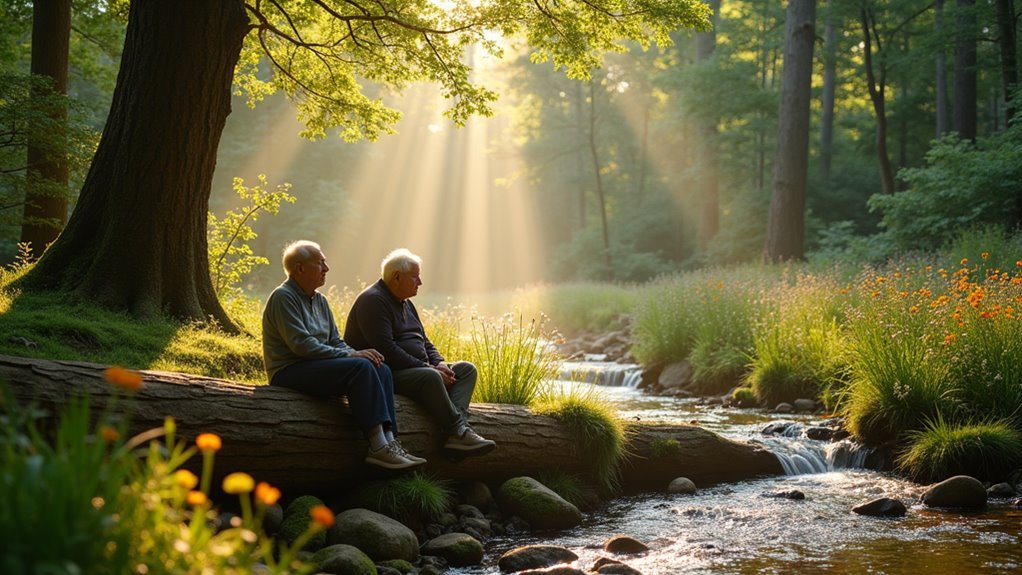
When you spend time in natural environments, your body automatically reduces cortisol production, which directly combats the chronic inflammation that accelerates aging. This stress reduction mechanism works immediately upon exposure to natural settings, triggering physiological changes that benefit your entire system.
Your cardiovascular health improves as nature lowers your heart rate and blood pressure, reducing inflammatory stress on your circulatory system. Meanwhile, muscle tension decreases, creating a relaxed state that further minimizes inflammation throughout your body.
Spending time outdoors also boosts your immune system by stimulating natural killer cells, which actively fight infections and lower inflammation.
These mental health benefits combine with enhanced physical wellness, creating a powerful defense against chronic inflammation. Regular nature exposure becomes your body’s natural anti-aging therapy.
Social Engagement in Outdoor Environments Combats Isolation
While nature’s anti-inflammatory benefits work on your physical health, outdoor environments also create powerful opportunities for meaningful social connections that directly combat the isolation many seniors face.
Nature’s healing power extends beyond physical wellness to foster meaningful social bonds that effectively combat senior isolation.
When you participate in group activities like nature walks or gardening circles, you’ll find these shared experiences naturally reduce loneliness while promoting community involvement.
- Group outdoor games like bocce ball encourage healthy competition and social engagement, strengthening bonds within senior living communities.
- Regular nature exposure creates casual conversation opportunities that enhance family connections and emotional benefits.
- Outdoor physical activity builds emotional resilience, helping you combat isolation while reducing stress and anxiety symptoms.
These natural settings provide the perfect backdrop for meaningful interactions that greatly improve your overall health and well-being.
Cognitive Function Improvement From Forest and Green Space Therapy
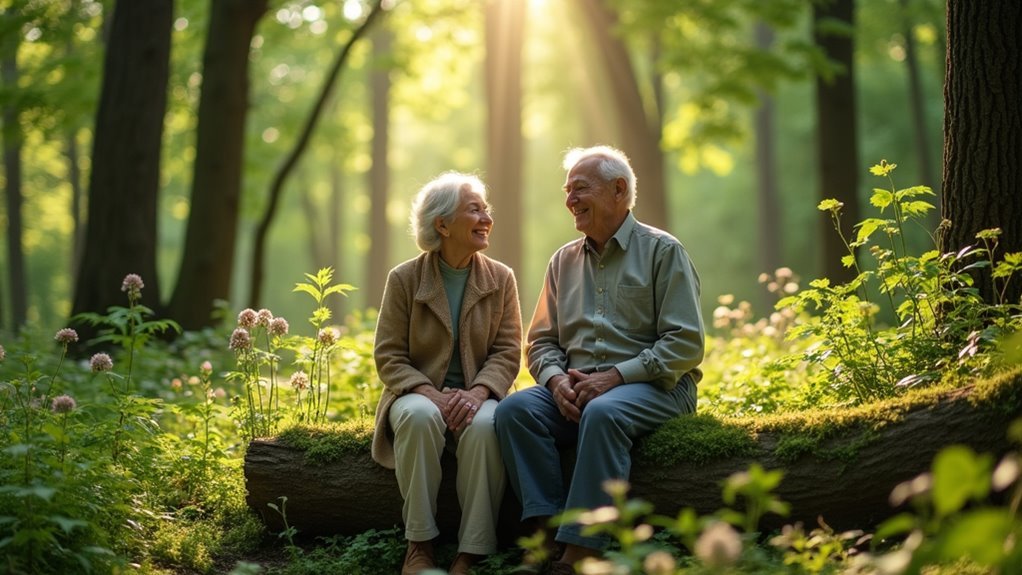
As you step into forest environments and green spaces, your brain experiences measurable improvements in cognitive function that can help maintain mental sharpness as you age.
Spending time in nature reduces mental fatigue while enhancing memory and concentration through stimulated neural pathways. When you’re outdoors, your anxiety levels drop considerably, creating ideal conditions for cognitive performance.
Natural environments help you overcome mental blocks and boost creative problem-solving abilities. You’ll find that hiking and forest walks improve spatial navigation skills, particularly beneficial if you’re experiencing mild cognitive impairment.
These outdoor exercises don’t just benefit heart health—they strengthen brain resilience and emotional balance.
Regular exposure to green spaces provides measurable cognitive benefits that support healthy aging and sustained mental acuity.
Frequently Asked Questions
How Does Going Outside Help Your Body?
Going outside boosts your vitamin D production, lowers cortisol levels, reduces blood pressure, and increases physical activity. You’ll experience improved cardiovascular health, stronger immunity, better mental wellness, and enhanced social connections that support overall body function.
What Happens if You Walk Outside Every Day?
You’ll strengthen your cardiovascular system, reduce anxiety and depression, boost cognitive function and memory, build social connections through group activities, and increase vitamin D levels that support your immune system and heart health.
Why Outdoor Activities Are Good for Seniors?
You’ll boost your cardiovascular health, strengthen bones through vitamin D exposure, reduce stress and depression, maintain social connections through group activities, and enhance cognitive function while improving mobility and reducing chronic disease risks.
Why Do I Feel Better When I Go Outside?
You’ll feel better outside because natural sunlight boosts your vitamin D production, reducing stress hormones like cortisol. Fresh air improves your cognitive function while outdoor movement enhances mood regulation and overall mental well-being naturally.
In Summary
You’ll find that stepping outside regularly transforms your aging experience in remarkable ways. You’re boosting your heart health with natural vitamin D, improving your balance through outdoor movement, and reducing harmful inflammation by simply being in nature. You’re also connecting with others and sharpening your mind through green space exposure. Don’t underestimate nature’s power—it’s your most accessible anti-aging tool that’s waiting just outside your door.


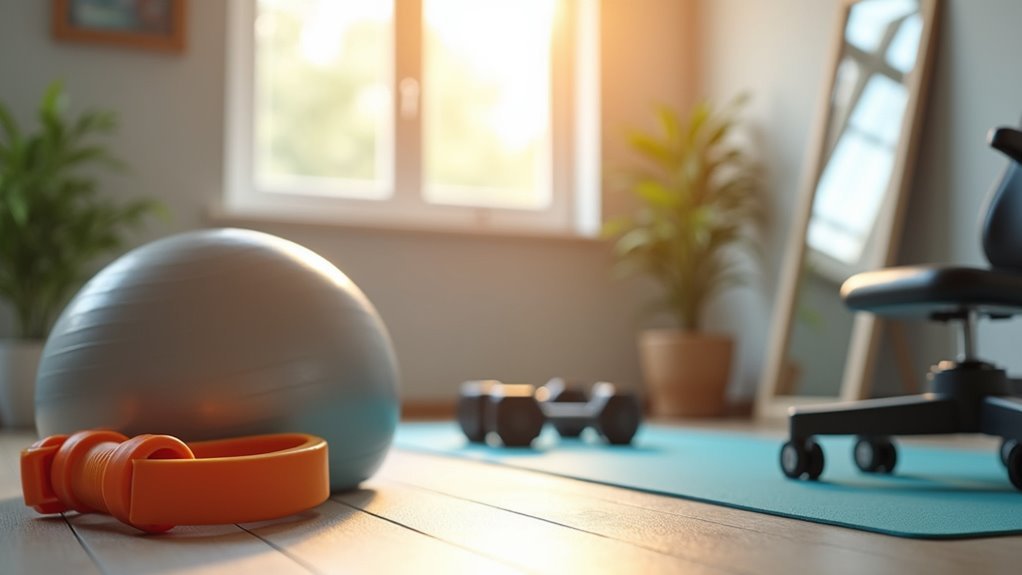
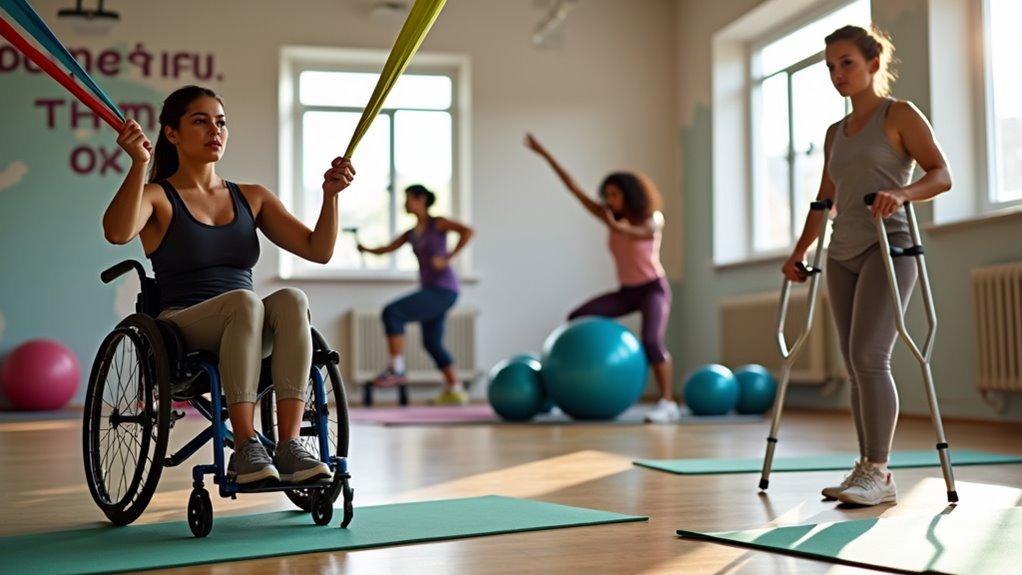
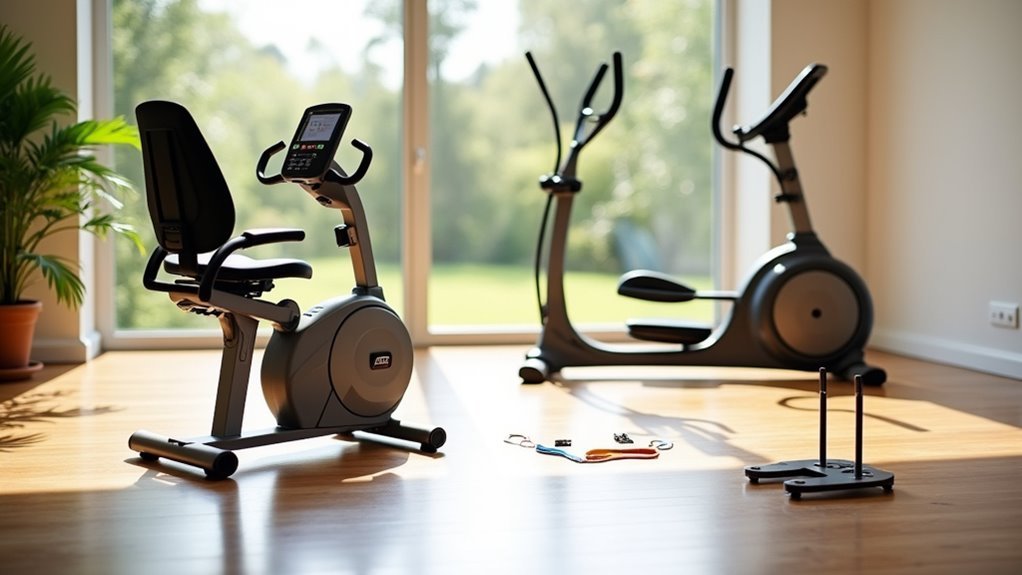
Leave a Reply